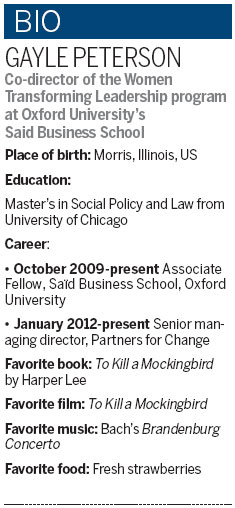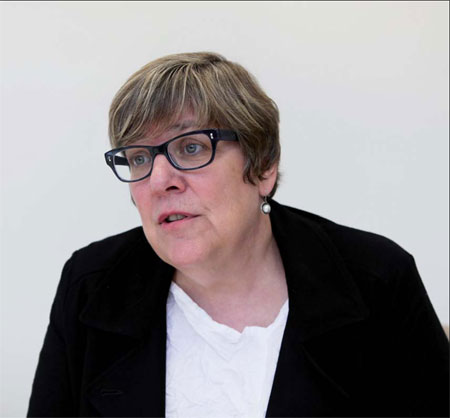Women lead the way in business
Updated: 2013-10-04 09:01
By Zhang Chunyan (China Daily)
|
|||||||||||
China now has more females heading companies than in any other country
China's rapid economic growth is creating exciting leadership opportunities for Chinese women, says Gayle Peterson, an expert on women and business issues.
Peterson, the co-director of the Women Transforming Leadership program at Oxford University's Saïd Business School, says the recent rapid economic growth means that "Chinese women who had not been promoted before have more choices now".
"You have to look for new talents," Peterson says. "Educated and hardworking women are moving into leadership roles."
According to the Women in Senior Management report released by professional services network Grant Thornton International, from 2012 to 2013, the percentage of senior management positions held by Chinese women jumped from 25 percent to 51 percent, the highest rate in the world.
Globally, women hold 24 percent of senior management positions, a 3 percentage point increase from last year, the report found.
The report interviewed 6,627 business leaders from all industry sectors across the globe from November 2012 to February 2013. The targeted respondents were chief executive officers, managing directors, chairmen and other senior executives.

Women have many advantages when they are given senior management positions, Peterson says. These include "their ability to collaborate, to work with many different people, to build a sense of team, their ability to be honest about what is working and not as well as their willingness to see human capital, like financial and social capital, as an asset."
Their creativity, compassion, willingness to collaborate and energy make women unique and effective, and that is what Chinese women have to offer corporations, she says.
More importantly, Peterson says China is creating a very different economy and doing something fresh and new. "Of course, women are part of this."
China is emerging as a center of opportunity by not adhering to the old ways of discrimination that Western women have faced for so long, Peterson says.
She does not believe that Western countries have promoted women in the same way as China is now, even though the West has had an open economic system for more than 200 years.
Peterson says that in the West there are women in boardrooms and other leadership positions.
"But in Asia, and China particularly, you are breaking down these boundaries because you are not adhering to how things have been done. You are creating something new and that is really exciting."
Other research supports Peterson's view.
According to the Hurun China's Women Rich List 2013, which was released by the Hurun Research Institute in September, more than half of the world's richest self-made female entrepreneurs are from China. Peterson says the big jump in the number of female billionaires in China shows that the country is providing a good business environment.
"Institutionalizing these opportunities through networks, support systems and public policies that encourage women to become leaders from infancy to childhood, adulthood and beyond is really important," she says.
Last year, she visited China and taught a course on "social investment" at Peking University. The program was organized by institutions that included Peking University, Oxford University and the University of Pennsylvania.
Among the 300 participants were many women entrepreneurs and philanthropists.
"These businesswomen were very engaged and interested in this course," Peterson says. "They were passionate and concerned about issues such as getting children out of poverty, and women's education and empowerment.
"Based on my experience, Chinese businesswomen are very creative, generous, smart, and hardworking. They often have global knowledge and are eager to try new things."
Women leaders need to come together and understand what converging factors make China successful and to scale those factors up, she says.
"The Chinese government and society should make sure that women are supported from an early age into their retirement, with political policies, an entrepreneurial spirit and resources to build women's capacities."
Government and society need strategies to maintain China's global leadership in the promotion of female business leaders.
While Chinese women are successful, especially as entrepreneurs, in education and in sports such as the Olympics, Peterson believes it is important that culture, sports, education, business and politics all promote Chinese women equally.
She also says a new challenge for Chinese businesspeople will be the alignment of public policies and government support. "So you are actually in a flow of change and government needs to support those changes. That is really important."
Despite the obvious progress, Peterson says Chinese women still face problems of inequality.
According to World Economic Forum data, China ranks 58 out of 135 countries in gender equality in politics.
How to deal with inequality is a long-term issue, she says. "Aligning public policies in business and education in a cohesive way will provide opportunities for women leaders."
Peterson completed a Master's of Science at HEC Paris through a joint program with Sad that focused on business and social-sector strategies for global change.
She was a co-founder of an international philanthropic consultancy that has evaluated and managed more than $10 billion (7.4 billion euros) in investments to address poverty, food, education and economic insecurity.
In September, Peterson launched the Women Transforming Leadership Program, which focuses on a new paradigm for women's leadership.
The world is becoming more complex, she says, and the issues that leaders face - such as financial issues, food shortages - are very challenging.
"Women have the talents and skills to deal with these complex issues, but often they do not recognize them as assets," she says.
So understanding where their natural assets are and how to build and strengthen their assets are the foundations on which women can grow, she says.
The program aims to inspire women to rediscover their identities and to offer them an opportunity to discuss and overcome personal and professional obstacles in their careers.
"We will also be moving participants toward growth and leadership training as individuals, in organizations and in the world at large," she says.
"We use a variety of techniques, such as experiential learning and networking. We bring in art, music, literature as well as technical tools to learn how to use and strengthen the assets of women leaders."
Peterson says women from anywhere in the world can apply online to join the program. They will then go through an interview selection process.
Now 30 women from 15 countries have already joined the program, including four from China and four from the United States.
"Businesswomen I have known from China and the United States share common characteristics," Peterson says.
"They collaborate. They build teams. They are creative and highly driven. And they are very compassionate and successful. I think female leadership characteristics cross cultural borders."
This November, Peterson will visit China again to do research on the emerging trend of social investment and will eventually publish a book on this topic.
"I will continue my cooperation with Chinese businesses," she says.
Wang Mengzhen contributed to the story.
zhangchunyan@chinadaily.com.cn
|
Gayle Peterson says women are a big part of the economic transformation in China. Wang Mengzhen / for China Daily |
(China Daily European Weekly 10/04/2013 page32)
Today's Top News
Xi calls for more APEC connectivity
Hey, big Chinese spenders
Wet weather fails to dampen FTZ interest
Service-sector expansion slows
RMB strengthens to new high against USD
Global expansion: Too fast?
China, Russia co-work for security in Asia-Pacific: Xi
Animal welfare to be added in training
Hot Topics
Lunar probe , China growth forecasts, Emission rules get tougher, China seen through 'colored lens', International board,
Editor's Picks

|

|

|

|

|

|






